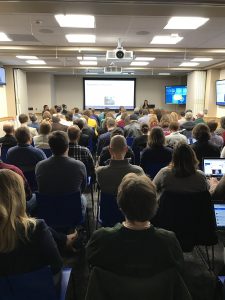I had the privilege of attending #BUDSC16 (Bucknell University Digital Scholarship Conference 2016) this past weekend, which was coordinated by some of my wonderful colleagues here in Library & Information Technology. I was not involved in the planning or coordination of the conference, so I had the guilty pleasure of being able to attend a conference at my own institution as a regular attendee.
The conference’s theme this year was “Negotiating Borders through Digital Collaboration,” and as you can guess, collaboration threaded its way through just about every presentation I attended. While much traditional scholarship (especially in the humanities) seems to be solitary work, digital scholarship, almost as a virtue, employs the work of a variety of contributors with diverse backgrounds. As our VP for Library & Information Technology, Param Bedi, noted in his remarks, it’s rare to attend a conference where you have professors, independent scholars, students, librarians, instructional technologists, and administrators one one room, but that’s definitely the case at #BUDSC16. The conference was preceded by a Crossing Borders summit, where the (intentionally) small group of participants sought to hash out many of the questions surrounding digital scholarship, such as: where does it (administratively) live, where are skill sets missing or duplicated, and how can we tear down departmental silos that might be hampering opportunities? Unfortunately I did not attend the summit, but I was amused (and very much encouraged by) one of the outcomes of the summit: the coining of the term scholaboration and the launch of a website/wiki related to it, which you can find at scholaboration.us (I like that the top-level domain is .us, which I’m reading as not United States, but us: we, all in this together). I’m eager to follow the progression of the wiki and to watch it grow, and perhaps to scholaborate on the wiki.

One of the most inspiring presentations was #BUDSC16 #s2c: Defining Student Success through Digital Scholarship Initiatives. As you an see in the picture on the left, this session was standing-room only. Students from Gettysburg and Lafayette spoke so passionately about their scholarship and how embracing digital techniques really helped them to do something new. The students’ research wasn’t necessarily related to each other’s, but they were in cohorts organized by their schools’ respective libraries and used similar tools (such as Scalar) to organize and showcase their research. The cohort model and the use of a shared tool really seems to have severed the students well; they really seemed to grow a deep sense of camaraderie and trust, which I’m sure encouraged them and helped them trust their instincts, which I’m helped them push the envelope and dig deeper in their research since they all seem to have a sense of ownership over their scholarship, which is so great to see, especially at the undergraduate level.
Like most of the sessions I attended, the two keynotes were remarkable. On Friday night, Dr. Tressie McMillan Cottom (assistant professor of sociology at Virginia Commonwealth University and faculty associate at Harvard’s Berkman Center for Internet & Society) spoke about VCU’s new master’s program in digital sociology. Her keynote was deep, engaging, and very funny at times. I think it’s the only keynote I’ve ever seen that got a standing ovation at the end. The second keynote, given by Dr. Safiya Umoja Noble, assistant professor in UCLA’s Department of Information Studies in the Graduate School of Education and Information Studies, was also captivating and eye-opening. She showed how Google, which might be viewed as an impartial spitter-out-of-the-most-relevant-information, is definitely not so and is unfortunately plagued by racist, sexist, and misogynistic results. It really underscored the need for a deep understanding of ethics and the need for subject matter expertise for those creating the algorithms underlying search interfaces.
If you have some time, I’d encourage you to scroll through the conference hashtag on Twitter, #BUDSC16 (also embedded on the righthand side of the page), to see what you missed if you weren’t here. And while you’re at it, start watching the #BUDSC17 hashtag so you can find out the second registration is open for next year’s conference.